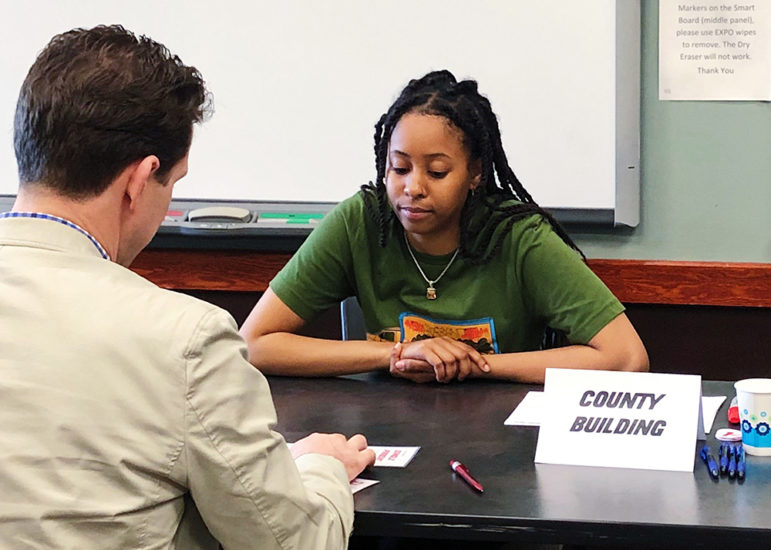
Juxtaposition Arts
Students simulate the process of getting housing assistance in Minneapolis in a game they developed called the Social Service Runaround. It was part of a youth participatory action research project at Juxtaposition Arts in Minneapolis.
At a community meeting in Minneapolis in May, students from Juxtaposition Arts, a Minneapolis youth-oriented art center, showed a game they had created.
Each player was armed with “time coins,” currency showing how much time they could spend. Each rolled a die to determine their status, such as unemployed, homeless, etc. The goal was to get rent money or other housing assistance from various agencies within the amount of time available.
“The simulation puts you in a situation where you’re homeless or evicted,” said Makeda Parrish, 19, a student who helped create the game. She spoke about it at a conference in November in Denver, sponsored by the expanded learning organization Every Hour Counts.
The game makes you move around the city to get the help you need, she said.
But players waited in line, sought fruitlessly to get required documents and fell behind when public transportation was unreliable.
Called the Social Service Runaround, the game was a living demonstration of the difficulties faced by many north Minneapolis households.
It was part of a youth participatory action research project at Juxtaposition Arts funded by a grant from Youthprise.
[Related: Young People Play Vital Role in Funding Programs That Impact Them at Youthprise]
A different kind of research
Parrish and the other students who created the game did so after several months of training at Juxtaposition Arts. They conducted 17 interviews with community agencies that provide housing assistance, including Hennepin County’s Emergency Assistance Department, the Salvation Army and local shelters and churches. One problem is that social service agencies don’t communicate with each other, Parrish said.
In youth participatory action research, young people get training and then do systematic research that can make changes in their community and the systems that affect them. The process empowers youth, according to the YPAR Hub at the University of California at Berkeley.
Participatory action research, as described in a UNICEF guide, means that the people affected by an issue participate in researching it. At the end of the research, they take action based on what they’ve learned.
“It places young people — their lived experience and their knowledge of their community — at the center and changes ideas about who is an expert,” said Adrienne Doyle, tactical lead and development associate at Juxtaposition Arts.
“It changes the power dynamic,” she said. Unlike traditional research, it is not “extractive.” Young people who are living in the midst of an issue or problem are the ones who produce information about it and use that information.
In the process young people gain research skills. Youth can also become the evaluators of the programs that are intended to serve them, according to the YPAR Hub.
Youthprise created a handbook this year that details how to do this kind of research, complete with exercises.
The housing assistance research done by students at Juxtaposition was connected to a research project conducted by the University of Minnesota Center for Urban and Regional Affairs (CURA) that looked at racial and other disparities in eviction rates.
The youth researchers found that the social service agencies they interviewed wanted specific improvements in the housing assistance system.
According to CURA, agencies wanted a re-evaluation of the federal poverty guidelines and a restructuring of county emergency assistance to address urgent needs. They also wanted better communication among agencies. And employees of these agencies wanted a livable wage for themselves, according to CURA.





























